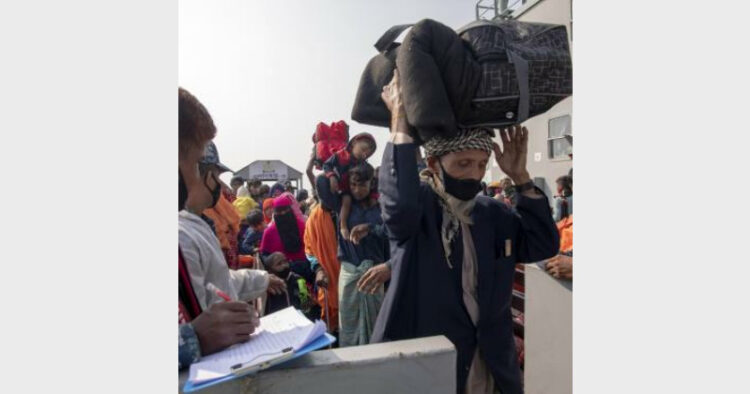UNHCR India has the mandate to grant International Protection only to the Rohingya Asylum seekers from Myanmar. It does not have any mandate to grant refugee status to Bangladeshi Nationals, as they do not have any protection needs and are not eligible for refugee status under UNHCR’s mandate in their own right.
In India, there are 23 518 Refugees and Asylum Seekers with having Country of Origin as Myanmar, according to the UNHCR Fact sheet Of September 2021.
These numbers include Rohingya Asylum Seekers, Refugees and Chin Refugees. The Refugee Agency Of the UN in India has deliberately not published Rohingya Asylum Seekers and Refugees separately, considering the sensitivity linked with the Rohingya Refugees in India. The actual number of Rohingya Refugees and Asylum Seekers in India is unknown. The number of Rohingya Refugees and Asylum Seekers registered with India is only known to UNHCR India and not even to the Ministry of Home Affairs Government of India, as UNHCR India does not share complete information with the Government basing their reason on their confidentiality clauses.
Both Rohingya and Bangladeshi populations have similarities, ethnically and linguistically. As such, marriage between Bangladeshi nationals and refugees from Myanmar in Bangladesh is prevalent. Many Bangladeshi nationals are married to Rohingya Refugees in Bangladesh.
In practice, the registration of marriages and divorces of refugees in Bangladesh has been progressively restricted. 2002 administrative circular initially stipulated that marriages between refugees could not be registered under the 1974 Muslim Marriages and Divorces Registration Act since the scope of that Act was confined to the registration of marriages of Bangladeshi citizens.
The circular established a distinct procedure for registering marriages of registered Rohingya refugees while excluding non-registered refugees. Two later circulars, published in 2014 and 2017, further undermined the right to marry for both citizens and refugees by directing registrars not to register the marriages of Bangladeshi citizens and unregistered refugees with refugees registered before 2017. In practice, these marriages are not registered in Bangladesh, and mixed marriage continues between Rohingya Refugees and Bangladeshi Nationals in Bangladesh.
UNHCR India has the mandate to grant International Protection only to the Rohingya Asylum seekers from Myanmar. UNHCR India does not have any mandate to grant refugee status to Bangladeshi Nationals, as they do not have any protection needs and are not eligible for refugee status under UNHCR’s mandate in their own right. However, UNHCR India has granted Refugee Status to the Nationals Of Bangladesh married to Rohingya Refugees based on family unity and derivative status.
The criteria for granting the derivative refugee status require a relationship of social, emotional or economic dependency between the Refugee Status Applicant and the Applicant for derivative refugee status. Dependency does not require complete dependence but can be mutual or partial dependence. The direction of the dependency is also irrelevant. This means that the Derivative Refugee Status Applicant may depend on the Refugee Status Applicant or vice versa.
Family members/dependents who are nationals of (or, if stateless, who have habitually resided in) a third country, in this case, Bangladesh who are not eligible for refugee status under UNHCR’s mandate in their own right may be granted derivative refugee status under the right to family unity if they meet the eligibility criteria for derivative refugee status.
Even if the family member/dependant does not have any protection needs vis-à-vis his or her country of nationality or habitual residence, it cannot be assumed that the Refugee Status Applicant and their family members and dependents will be able to enjoy their right to family unity in the country of nationality or habitual residence of the family member/dependant.
There is often no automatic right of entry or residence for the non-national family members in such cases. Sensitivities regarding mixed marriage and/ or the nationality of the non-national family members may also, depending on the circumstances of the case, make it unreasonable to expect the family to establish residence in the third country.
In the above circumstances, as seen above, UNHCR India has granted Refugee Status to the Nationals of Third Country Bangladesh, based on third family unity.
A careful examination must be done by the Ministry of Home Affairs of such cases as examined above. The third country Nationals (Bangladeshi) must be repatriated to their country of origin and their family members.
On 09 October 2021, a Memorandum Of Understanding was signed between the Government Of Bangladesh and UNHCR. The Government Of Bangladesh has made an extensive investment in Bhasan Char Project, recalling that Bhasan Char is a temporary arrangement for the Refugees residing there until they can return to Myanmar safely, voluntarily, and dignifiedly.
The objective of the aforesaid MOU is to establish a framework of cooperation between the parties in relation to the UN’s overall engagement on Bhasan Char, based on Humanitarian and protection principles and the Government of Bangladesh Priorities and policies. The Principle objectives of the above MOU inter alia are that the UN will operate on Bhasan Char under the overall coordination of and consultation with the Government Of Bangladesh. The Government Of Bangladesh will ensure relocation to and the stay of Refugees on Bhasan Char. The Government and the UNHCR will ensure joint registration and documentation for the refugees, etc.
The Government Of India and the Government Of Bangladesh share a strong bilateral relationship. In fact, India and Bangladesh relations today are deeper than any other strategic partnership. In the light of the above, the Government Of India may want to enter into a bilateral agreement with Bangladesh, and the Government Of India may want to “Repatriate” the Rohingya Population living in India to Bhasan Char, after Identification and Verification under the Rule of Law.
Pankaj Kumar is former expert on Mission to the United Nations High Commissioner for the Refugees and Advocate, Supreme Court of India. Gautam Jha is Advocate on Record, Supreme Court of India















Comments